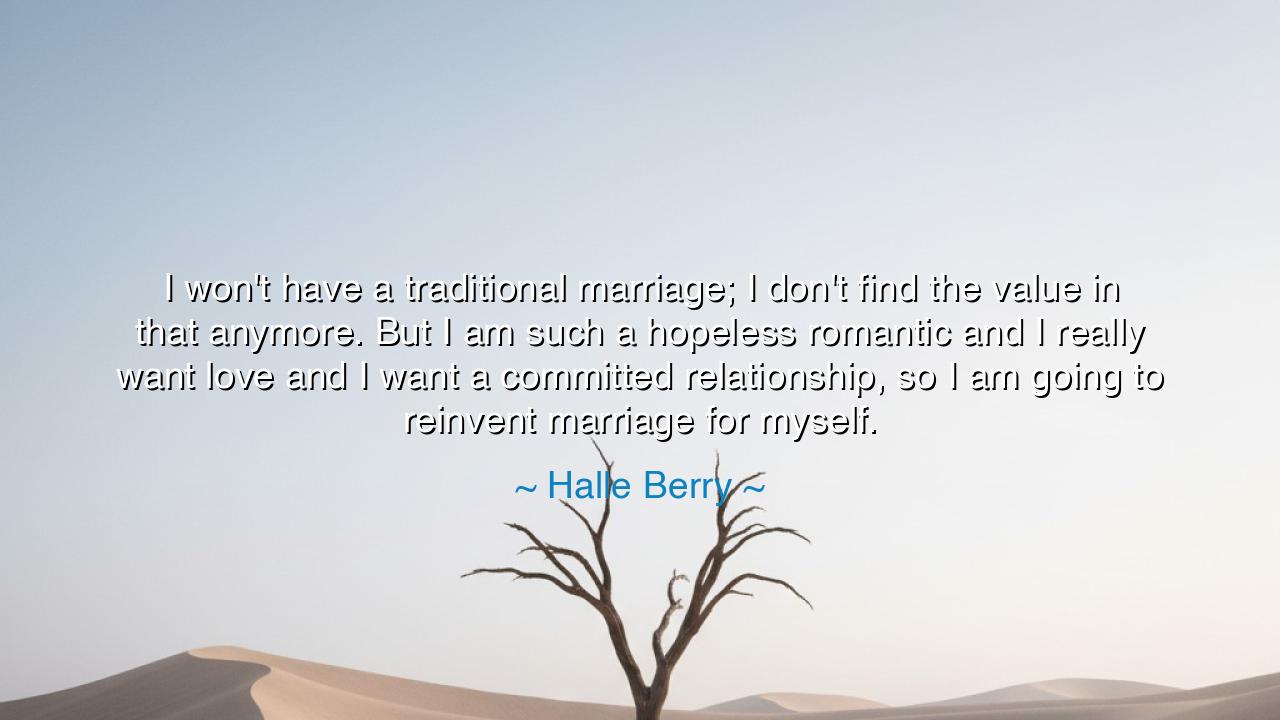
I won't have a traditional marriage; I don't find the value in
I won't have a traditional marriage; I don't find the value in that anymore. But I am such a hopeless romantic and I really want love and I want a committed relationship, so I am going to reinvent marriage for myself.






In the words of Halle Berry, spoken with courage and longing, there resounds a declaration of both defiance and hope: “I won’t have a traditional marriage; I don’t find the value in that anymore. But I am such a hopeless romantic and I really want love and I want a committed relationship, so I am going to reinvent marriage for myself.” These words are not the musings of one who scorns love, but the vow of a seeker who refuses to accept stale forms when the heart still burns with desire for the true.
The ancients knew well the power of reinvention. The Greeks and Romans bound their unions with rites of law and sacrifice, yet even they knew that the essence of marriage was not in the ritual but in the bond between souls. In later ages, traditions hardened, becoming cages rather than vessels. Berry’s words stand in this lineage of rebellion: to discard the husk when it no longer nourishes, and to fashion a new form that holds meaning. She is not against love, nor against union—she is against lifeless convention, against rituals that do not reflect truth.
To call oneself a hopeless romantic in the same breath is to reveal the paradox: though disillusioned with tradition, she has not abandoned faith in love. Instead, she honors its fire all the more fiercely, insisting that it must be made authentic, reshaped, reborn in her own life. In this, she echoes the spirit of the Renaissance, when art and science broke free of old dogmas and remade the world according to new visions. To reinvent marriage, as she says, is not to destroy it, but to redeem it, to rescue it from formality and restore it to passion.
History bears witness to such reinventions. Consider Martin Luther, who shattered the rigid structures of the medieval church and proclaimed a reformation. He did not seek to end faith, but to purify it, to return it to sincerity. So too have women and men across ages redefined marriage to fit the truth of their lives. In the 19th century, when arranged unions gave way to unions of affection, many decried it as dangerous—but from it was born the modern idea of marrying for love. Berry’s words stand in that same revolutionary stream: she demands a union that breathes, not one that suffocates.
The deeper meaning of her vow is that commitment must be rooted in authenticity, not in inherited customs. To join lives is not sacred because it follows rules, but because it is chosen with truth, with courage, with eyes open. The form may change across centuries—betrothal rites, legal contracts, or vows whispered in private—but the essence remains: two souls promising to walk together in fidelity and care. To reinvent marriage is to recognize that the heart’s truth is more enduring than the weight of tradition.
The lesson is clear: do not cling to forms that no longer serve the spirit. Whether in love, in work, or in life’s rituals, seek not the empty shell of tradition, but the living flame within it. If you are a hopeless romantic, do not despair when old structures fail you. Instead, shape new ones, as Berry proclaims, according to your heart’s measure. For love does not wither when forms collapse; rather, it demands new vessels, just as wine demands a new cup when the old one cracks.
Therefore, O listener, be unafraid to reinvent what no longer brings truth. Do not reject love because tradition disappoints you; do not reject commitment because others misuse it. Instead, carve your own path, honor your own spirit, and let your union—whatever form it takes—be radiant with sincerity. For in the end, tradition is but the wrapping; love is the gift. And to honor love with authenticity is to stand among the wise, the bold, and the eternal.






AAdministratorAdministrator
Welcome, honored guests. Please leave a comment, we will respond soon